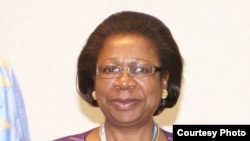BANGKOK —
A pioneering doctor in the fight against the river blindness disease in sub-Saharan Africa has received a prestigious award in Thailand - the Prince Mahidol Award for outstanding contributions in public health. Doctor Uche Amazigo says she is upbeat about efforts to combat the disease, despite political instability that has set back outreach efforts.
The World Health Organization (WHO) says as many 18 million people, largely in Africa and Yemen, are infected by river blindness, a parasitic disease that has left 500,000 people visually impaired and a further 270,000 blinded.
The WHO says long-term treatment for as long as 20 years is crucial to ensure victims are free from the parasite.
The long duration of treatment means that disruptions in care, especially from conflict or political instability that displaces populations, set back efforts to contain the disease.
Amazigo, former director of WHO’s African Program on Onchocerciasis, points to past conflicts in Southern Sudan as a challenge for medical workers to deliver treatment and necessary drugs.
“It disrupts the ability of people to even distribute health commodities among themselves like ivermeticin, treated bed nets and vitamin ‘A’. We had huge challenges in Southern Sudan. We started the program in 1999 - it collapsed because of conflict. We went back in 2001, it collapsed because of conflict and we’re back again in 2010 - Now we cross our fingers that it’s going to continue," she said.
The Nigerian-born Amazigo successfully introduced locally-directed treatment to communities. The networks now cover 117,000 communities within 19 African governments, backed by civil societies and donors.
In 1987, U.S. pharmaceutical giant Merck and Co. launched a program donating the drug ‘ivermectin’ to all those affected by the disease as long as necessary, based on the community directed program.
Amazigo says the disease is especially harsh on women who are often stigmatized when they begin showing the disease’s first signs as skin rashes.
“More, more towards women because we found that it increased the age of marriage. Girls would not marry at the right age and would also reduce the period of breast feeding [due to rashes] and there was divorce also. But men too were affected by that," she explained.
But Amazigo says she is "satisfied" with progress being made with the acceptance of partners, health providers and governments recognizing community participation as critical to reaching more than 120 million people at risk.
River blindness is recognized as one of the neglected tropical disease contributing to poverty and under-development in Africa. The WHO has estimated $1.5 billion funding is needed to combat these diseases in Africa until 2017.
Amazigo was in Thailand to receive the prestigious Prince Mahidol Award for outstanding contributions in public health. Britain’s Sir Michael Rawlings, chairman of the National Institute for Health and Clinical Excellence, was also recognized for his work in medicine.
The World Health Organization (WHO) says as many 18 million people, largely in Africa and Yemen, are infected by river blindness, a parasitic disease that has left 500,000 people visually impaired and a further 270,000 blinded.
The WHO says long-term treatment for as long as 20 years is crucial to ensure victims are free from the parasite.
The long duration of treatment means that disruptions in care, especially from conflict or political instability that displaces populations, set back efforts to contain the disease.
Amazigo, former director of WHO’s African Program on Onchocerciasis, points to past conflicts in Southern Sudan as a challenge for medical workers to deliver treatment and necessary drugs.
“It disrupts the ability of people to even distribute health commodities among themselves like ivermeticin, treated bed nets and vitamin ‘A’. We had huge challenges in Southern Sudan. We started the program in 1999 - it collapsed because of conflict. We went back in 2001, it collapsed because of conflict and we’re back again in 2010 - Now we cross our fingers that it’s going to continue," she said.
The Nigerian-born Amazigo successfully introduced locally-directed treatment to communities. The networks now cover 117,000 communities within 19 African governments, backed by civil societies and donors.
In 1987, U.S. pharmaceutical giant Merck and Co. launched a program donating the drug ‘ivermectin’ to all those affected by the disease as long as necessary, based on the community directed program.
Amazigo says the disease is especially harsh on women who are often stigmatized when they begin showing the disease’s first signs as skin rashes.
“More, more towards women because we found that it increased the age of marriage. Girls would not marry at the right age and would also reduce the period of breast feeding [due to rashes] and there was divorce also. But men too were affected by that," she explained.
But Amazigo says she is "satisfied" with progress being made with the acceptance of partners, health providers and governments recognizing community participation as critical to reaching more than 120 million people at risk.
River blindness is recognized as one of the neglected tropical disease contributing to poverty and under-development in Africa. The WHO has estimated $1.5 billion funding is needed to combat these diseases in Africa until 2017.
Amazigo was in Thailand to receive the prestigious Prince Mahidol Award for outstanding contributions in public health. Britain’s Sir Michael Rawlings, chairman of the National Institute for Health and Clinical Excellence, was also recognized for his work in medicine.




